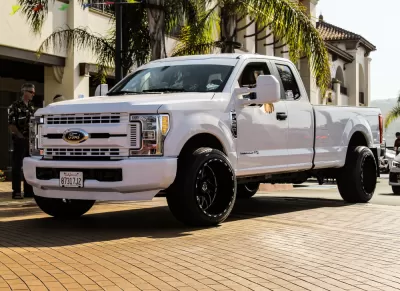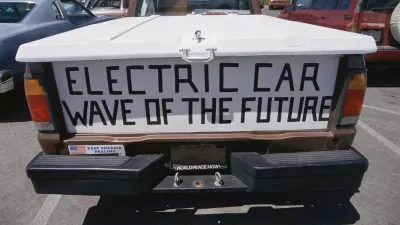A consumer survey found that less than a third of respondents considered carbon emissions or the environment when they last purchased a motor vehicle, yet three-quarters of Americans consider climate change a major problem or crisis.

Call it the great SUV-climate disconnect. A consumer survey released December 16 by Zebra, an insurance comparison website, revealed a surprising reason that has contributed to the abandonment of smaller passenger vehicles by most American auto shoppers—they simply aren't considering climate change or the environment in their decision as to what type of light-duty vehicle to buy. Yet, about 80 percent of Americans "say that human activity is fueling climate change."
"With more electric vehicles [EVs] on the market and increased concerns about the environment, it seems the preference for larger SUVs holds more significance for car buyers," states the company's post on their survey results.
We asked 1,500 Americans if they considered CO₂ emissions and/or the environment when they last bought a car and found 68% did not,"
These results are reflected in recent auto sales numbers where crossovers, SUVs, and pickup trucks are shown to be the most popular vehicles for American car shoppers. The results also provide some insight into car buyer priorities and attitudes toward the environment.
EV sales drop in U.S.
Russ Mitchell, who covers the auto industry for the Los Angeles Times, reported last month on rather grim 2019 EV sales data, with a notable exception.
Despite the debut of 45 pure electric and plug-in hybrids in the United States last year, only 325,000 plug-in passenger vehicles were sold, down 6.8% from 349,000 in 2018, according to Edmunds. That is just 2% of the 17 million vehicles of all types sold in the United States in 2019. Numbers for California aren’t available yet, but 112,961 EVs were sold in the first three quarters of 2019, up only 5.6% from the year-earlier period.
“The number of battery-electric models available more than doubled last year, but EV sales didn’t budge much. That’s troubling,” said Mark Wakefield, who runs the automotive practice at consulting firm AlixPartners.
The numbers in the United States look especially grim. Tesla remains the exception. U.S. sales of the Model 3 grew by 14% in 2019, to 159,000, according to InsideEVs. Global Model 3 deliveries more than doubled, to 300,600, with a big push in Europe.
SUVs nullify emissions reductions associated with EVs
"[T]he emission-reducing impact of electric, hybrid and even plain-old smaller and more fuel-efficient gas-powered vehicles are being negated by the emission-increasing impact of SUVs," reports Kea Wilson for Streetsblog USA (source article). Both Wilson and The Zebra draw heavily from the Paris-based International Energy Agency (IEA) for information on the environmental and energy impact of SUVs, which are not just a U.S. phenomenon, but global as well.
The chart below shows that SUV greenhouse gas emissions are rising, even as emissions by all other internal combustion engines (“other ICEs”) are dropping.
Source: International Energy Agency
In his tweet about "the global rise of SUVs" that was a major finding in IEA's World Energy Outlook 2019, executive director Fatih Birol wrote, "If the appetite for heavier & bigger cars continues to grow at a similar pace to the past decade, this would add nearly 2m barrels a day in global oil demand by 2040."
"The impact of its rise on global emissions is nothing short of surprising," wrote IEA researchers Laura Cozzi and Apostolos Petropoulos on the outlook report's findings on the dominance of SUVs over cars.
The global fleet of SUVs has seen its emissions growing by nearly 0.55 Gt [gigatonnes] CO2 during the last decade to roughly 0.7 Gt CO2. As a consequence, SUVs were the second-largest contributor to the increase in global CO2 emissions since 2010 after the power sector, but ahead of heavy industry (including iron & steel, cement, aluminium), as well as trucks and aviation.
Light truck sales dominate in all 50 states
The Auto Alliance, an advocacy group representing automakers who build 70% of all cars and light trucks sold in the U.S., found that light trucks, a category "including SUVs, CUVs, vans, and pickups," had a national market share of 71.6% for January through October 2019 auto sales, with "car sales" comprising the remaining 28.4% They also list the prior six years sales on the same webpage – the former has been increasing every year since 2012 when sales of the two types of light-duty vehicles were almost even.
All 50 states showed a majority consumer preference for light trucks, one of several findings in their "Consumers Drive the Auto Industry" report based on 2018 auto sales. California was lowest with 54% and North Dakota the highest with 88%. [Select your state or congressional district to see how it ranks in six automotive categories.]
- For electric vehicles (battery and plug-in hybrids): 4.74% for California was the highest, while Mississippi had 0.11 percent.
- For conventional hybrids, Washington was highest with 4.29%; North Dakota lowest with 0.67%.
"This data aligns with our study and other studies that show Americans are worried about global warming but unwilling to make lifestyle or financial changes to mitigate climate change," state The Zebra researchers.
Related in Planetizen:
-
U.S. Land Use, SUVs Targeted in New U.N. Climate Change Report, November 27, 2019
-
The Case for Banning SUVs, October 26, 2019
-
The Future of the American Auto Industry: Not Cars, May 14, 2018
-
Climate Challenge: Not Enough EVs or Too Many SUVs? March 5, 2018
FULL STORY: Few Car Buyers Consider Emissions At The Dealership

Alabama: Trump Terminates Settlements for Black Communities Harmed By Raw Sewage
Trump deemed the landmark civil rights agreement “illegal DEI and environmental justice policy.”

Study: Maui’s Plan to Convert Vacation Rentals to Long-Term Housing Could Cause Nearly $1 Billion Economic Loss
The plan would reduce visitor accommodation by 25% resulting in 1,900 jobs lost.

Planetizen Federal Action Tracker
A weekly monitor of how Trump’s orders and actions are impacting planners and planning in America.

Wind Energy on the Rise Despite Federal Policy Reversal
The Trump administration is revoking federal support for renewable energy, but demand for new projects continues unabated.

Passengers Flock to Caltrain After Electrification
The new electric trains are running faster and more reliably, leading to strong ridership growth on the Bay Area rail system.

Texas Churches Rally Behind ‘Yes in God’s Back Yard’ Legislation
Religious leaders want the state to reduce zoning regulations to streamline leasing church-owned land to housing developers.
Urban Design for Planners 1: Software Tools
This six-course series explores essential urban design concepts using open source software and equips planners with the tools they need to participate fully in the urban design process.
Planning for Universal Design
Learn the tools for implementing Universal Design in planning regulations.
Caltrans
Smith Gee Studio
Institute for Housing and Urban Development Studies (IHS)
City of Grandview
Harvard GSD Executive Education
Toledo-Lucas County Plan Commissions
Salt Lake City
NYU Wagner Graduate School of Public Service






























